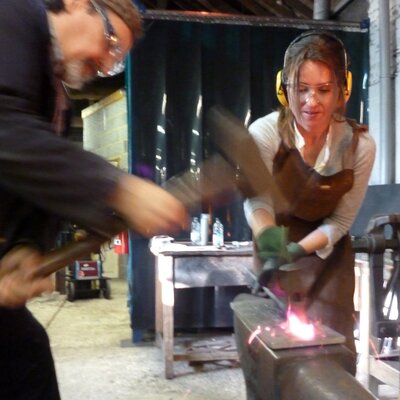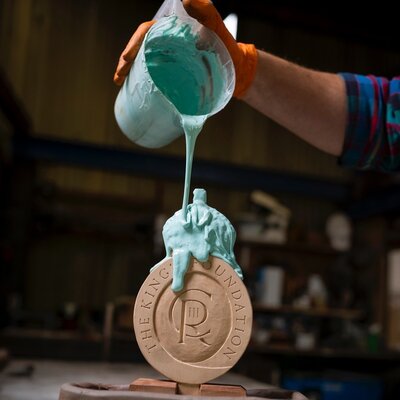This course aims to introduce you to the basic skills of the ancient craft of blacksmithing.
The aim is that you will create various items throughout the three-day experience, immersing yourself in the world of forging, with projects such as arrowhead making, candle holders, cooking utensils and tool making.
You will be introduced to various skills, including forging, tapering, forming, joinery, hot cutting, fire welding, heat treating, hardening and tempering.
On the first evening, you will meet your tutor and discuss general ideas you may have.
Day 1:
You will learn how to control the fire and cover basic techniques of forging, forming and punching whilst creating a few items along the way. The typical items would be hooks, key rings and arrow heads.
By the end of the first day, you and your tutor will have a greater understanding of what you would like to achieve over the rest of the course according to your skill level.
Day 2:
You will be introduced to further skills of fire-welding and joinery to enable more difficult projects, such as candle holders, hinges and cooking utensils.
Day 3:
During this day, you can either complete the piece already started to create a more complex item using joinery, fire welding and punching techniques: for example, hanging brackets, a set of door hinges or decorative handle holders, or you could also choose this day to continue making previous items and see progression in standards.
By the end of the course, you will have accumulated and practised many of the techniques introduced, and you will have created several interesting items to take home with you.
Included
On this course the College will supply all of the materials, including all fuel costs and mild steel, such as 8mm square steel for decorative hanging chains, 6mm flat steel for hinges, 10mm round steel for arrow heads, 10mm square steel, slitting discs and beeswax.
Leather aprons, welding gauntlets, goggles, welding helmets and ear defenders can be borrowed from the Forge.
What students need to bring
You will need to wear clothing suitable for workshop use, together with steel toe capped boots. Please note that cotton or woollen clothing is preferable to nylon or other synthetics. Shorts do not provide necessary protection.
For your safety, it is mandatory to wear steel toe capped safety boots when undertaking a course in the Forge. You must provide your own footwear and bring it with you to wear on the course. If you fail to bring suitable footwear, you will not be able to take part in the course. Safety boots can be purchased from most tool hire shops and builders merchants, as well as online.
You must wear goggles (provided) and suitable protective clothing for this course. Leather aprons, welding gauntlets, goggles, welding helmets and ear defenders can be borrowed from the Forge or you can bring them along if you have them. If, for example, you have particularly large or small hands, your own leather work gloves are likely to be a better fit.
Available to buy
Available from shop:
- A good variety of art and craft materials
Additional information
Please note: This course will be in the Forge, which is a 10-minute walk from the main house through the walled garden or can be accessed by car. As this course is held in the Forge, morning coffee and afternoon tea will be held in the nearby Carrington Studio.
Please note that tutor supervision is always required when you are working in the Forge.
Arrival day - first date of course
Residential students can arrive from 4pm, non-residential students to arrive by 6.45pm for registration
Student welcome, followed by dinner: 6.45pm (dinner included)
Teaching session: 8pm-9pm (attendance is essential)
Daily timetable
Course teaching: 9.15am-5pm
Morning session: 9.15am-12.45pm including coffee/tea break
Lunch break: 12.45pm-2pm (lunch included)
Afternoon session: 2pm-5pm including coffee/tea break
Teaching finishes: 5pm
Evening working: students may have access to workshops until 9pm, but only with permission from the tutor and provided any health and safety guidelines are observed.
Departure day - last date of course
Course teaching: 9.15am-3pm (lunch included)
Teaching finishes: 3pm
Residential students will need to check out of rooms by 10am.
Please note, the tutor may make slight variations to the daily timetable as required.




